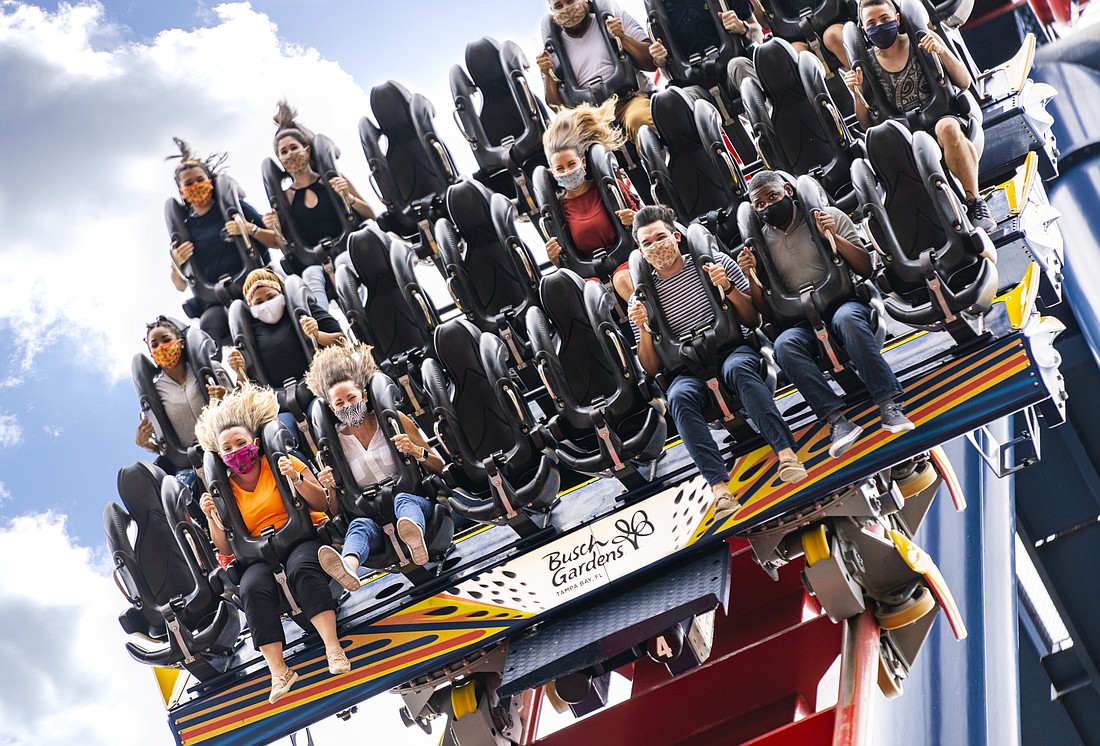- March 17, 2025
-
-
Loading

SeaWorld Entertainment Inc., the parent company of Busch Gardens Tampa Bay and Adventure Island, suffered mightily during the COVID-19 shutdown. According to its first quarter financial report, revenue dropped by $67 million, or 30.4%, to $153.6 million, compared to the first quarter of 2019. That resulted in a net loss of $19.5 million.
The loss, predictably, was driven by plunging attendance — some 1 million fewer people visited the company’s parks during the first quarter of 2020 compared to the same time period last year.
‘Every aspect of the business, we've dissected. We've had to reconfigure many areas of our park.’ Stewart Clark, Busch Gardens Tampa Bay
Although the company does not disclose revenue and attendance figures on a park-by-park basis, Busch Gardens President Stewart Clark, who’s been with the company for 35 years, says the coronavirus “pulled the rug out” from under what was shaping up to be a record year in terms of visits and sales. In the first two months of 2020, the company’s revenue grew 12%, and attendance was up 9%.
The 56-year-old Clark joined one of SeaWorld Entertainment’s precursor companies right out of college. Named president of Busch Gardens in 2017, he has weathered several crises before but nothing like COVID-19, which completely shut down SeaWorld parks March 16.
“No one has ever led, managed, directed or even been part of something like this,” Clark says. “I can't wait until when this is all behind us, and you do the final analysis, you can say, ‘This is how to best lead [an organization] through a pandemic’ — which, hopefully, is a once-in-a-lifetime experience.”
That analysis is a long time off. Right now, Clark faces the daunting task of rebuilding the fortunes of Busch Garden, which reopened, at reduced capacity and with a reservation system in place, June 11. His core challenge: help the park return to profitability while operating in a responsible way that makes guests feel safe and comfortable.
Clark says the park, at first, will take things slow. The whole point of theme parks is to provide an escape, a place for families to forget real life for a while and make some treasured memories. But that starts, he says, with making people feel safe and comfortable — a process that can’t and shouldn’t be rushed.
“Every aspect of the business, we've dissected,” Clark says. “We've had to reconfigure many areas of our park.”
Some of the innovative changes include relaxation zones where, as long as proper social-distancing practices are followed, guests can take off their facial coverings.
“Those have been really helpful,” Clark says. “You're never far away from a relaxation zone.”
Setting expectations and providing clear directions have also been key to Busch Gardens’ reopening. Staff have installed vast amounts of new signage to inform guests about changes to park operations in the COVID-19 era.
“Some days I laugh and call the place ‘Signworld’ because we have so many signs and reminders everywhere,” Clark says. “But they're super effective.”
Most guests have been compliant with mask requirements. “You always have somebody who wants to push the boundaries,” Clark says. However, social distancing measures are tougher to monitor and enforce, particularly in areas like Adventure Island’s waterslides and pools.
“Our society is changing, and that’s making it easier every week,” he says. “But probably our biggest challenge was figuring out how we’re going to [socially] distance people in certain areas.”
Busch Gardens and Adventure Island have made temperature checks mandatory upon entering the parks. Guest surveys, Clark says, indicate that the rigorous safety standards are having the desired effect of making people feel safe and — relatively — worry-free while they are enjoying the attractions with friends and family members.
“People need to get out,” Clark says. “They are absolutely stir-crazy at this point. We have guests stopping to say, ‘Thank you for reopening; thank you for giving us somewhere to bring our families.’”
It could be quite some time before SeaWorld parks are able to operate at full capacity. But the company, in its first quarter report, says it has $400 million in cash on hand and, on April 30, raised $227.5 million in a private offering and also secured an increase in its line of credit, from $210 million to $332.5 million.
"While the world is experiencing an unprecedented global health crisis that has impacted nearly everyone on the planet," SeaWorld Entertainment interim CEO Marc Swanson states in the report, "we are confident in the resiliency of our business, our ability to weather this crisis and that we will emerge an even stronger company,"